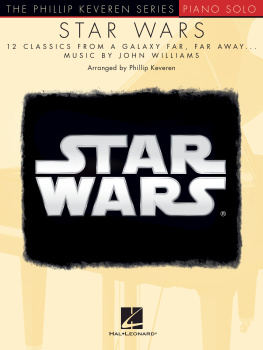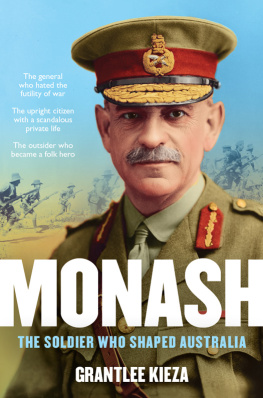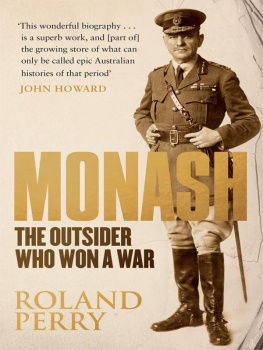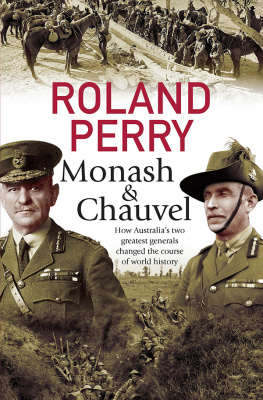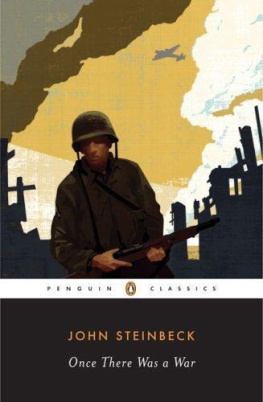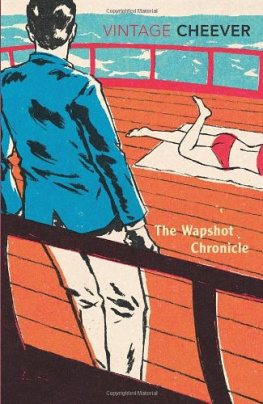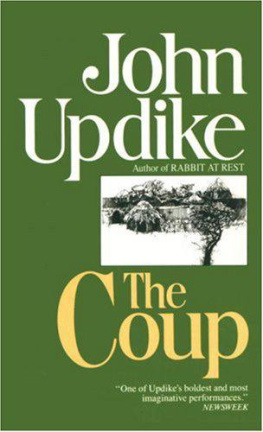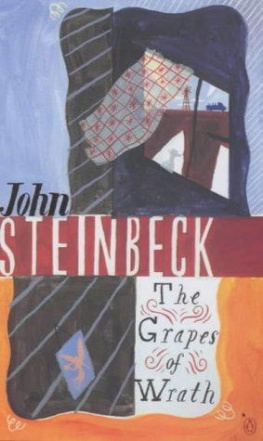PRAISE FOR WAR LETTERS OF GENERAL MONASH
His study of Law, Arts and Engineering greatly helped John Monash not only to provide brilliant, innovative leadership in World War I, but also to write clearly and in an enticing way. His superb war letters and accounts of the Western Front contain wonderful first-hand insights into this seminal period of world history.Tim Fischer, former Deputy Prime Minister and author of Maestro John Monash
As a writer, Monash has a great eye.Les Carlyon, author of Gallipoli
Monash wrote 75,000 letters and this war correspondence selection reflects a calm, rational mind and demonstrates succinct descriptive skills to rival any professional writer. He wrote in real-time without revision, sometimes during battles. This leaves us with a potted personal history of one of two biggest wars by the most outstanding and eloquent general of the conflict, who did more than anyone else to win and end it.Roland Perry, author of Monash: The Outsider Who Won a War
John Monash was one of the most remarkable men to rise from civilian life to high-level combat command in any war. The greatest general Australia has ever produced, and an equal of any during the world wars.Eliot A. Cohen, Robert E. Osgood Professor of Strategic Studies, Johns Hopkins University, and author of Supreme Command
In the eyes of many Monash was the greatest Allied Field Commander of World War I. His leadership of the Australian Army Corps in 1918 was exemplary.John Howard, former Prime Minister of Australia
His was the most brilliant leadership ever shown in any activity by an Australian.Bob Carr, former Premier of New South Wales
Almost unique among World War I generals, John Monash was a master tactician and strategist who cared for the lives and welfare of the men he commanded.Mike Carlton, author and journalist

Published by Black Inc.,
an imprint of Schwartz Publishing Pty Ltd
3739 Langridge Street
Collingwood VIC 3066 Australia
email:
www.blackincbooks.com
First published (with an introduction by F.M. Cutlack) by Angus & Robertson, Sydney, 1934
This edition published by Black Inc., Melbourne, 2015
Introduction and historical notes A.K. Macdougall 2015, who asserts his right to be known as the author of his work.
A.K. Macdougall and the publisher wish to thank Michael Bennett, who, on behalf of the Monash family, provided his assistance and permission to reproduce in this edition previously unpublished correspondence.
ALL RIGHTS RESERVED.
No part of this publication may be reproduced, stored in a retrieval system, or transmitted in any form by any means electronic, mechanical, photocopying, recording or otherwise without the prior consent of the publishers.
The National Library of Australia Cataloguing-in-Publication entry:
Monash, John, Sir, 18651931, author.
War Letters of General Monash / John Monash; introduction and historical notes by A.K. Macdougall.
9781863957441 (hardback)
9781925203332 (ebook)
Monash, John, Sir, 18651931 Correspondence.
Generals Australia Correspondence.
World War, 19141918 Personal narratives, Australian.
Macdougall, A.K., 1943 writer of introduction.
940.48194
Cover and text design: Peter Long
Biographical data in this index researched by A.K. Macdougall
Photographs reproduced with permission of Monash University Archives, the Imperial War
Museums and the Australian War Memorial.
CONTENTS
PICTURE SECTION
Grouping into Australian Divisions of Artillery and Infantry Brigades, During the Period of May to October 1918, and the General Officers Commanding Them
Selection from the Records of Deeds of Gallantry of Soldiers Awarded the Victoria Cross
General Rawlinsons Message to the Australian Corps, 1918
INTRODUCTION
THE AUSTRALIAN ARMY CORPS
T HE renown of the Australians as individual fighters, in all theatres of the Great War, has loomed large in the minds and imagination of the people of the Empire.
Many stories of the work they did have been published in the daily Press and in book form. But it is seldom that any appreciation can be discovered of the fact that the Australians in France gradually became, as the war progressed, moulded into a single, complete and fully organised Army Corps.
Seldom has any stress been laid upon the fact that because it thus became a formation fixed and stable in composition, fighting under a single command, and provided with all accessory arms and services, the Corps was able successfully to undertake fighting operations on the grandest scale.
There can be little question, however, that it was this development which constituted the paramount and precedent condition for the brilliant successes achieved by these splendid troops during the summer and autumn of 1918 successes which far overshadowed those of any earlier period of the war.
For a complete understanding of all the factors which contributed to those successes, and for an intelligent grasp of the course of events following so dramatically upon the outbreak of the great German offensive of March 21st of that year, I propose to trace, very briefly, the genesis and ultimate development of the Corps, as it became constituted when, on August 8th, it was launched upon its great enterprise of opening, in close collaboration with the Army Corps of its sister Dominion of Canada, that remarkable counter-offensive, which it maintained, without pause, without check, and without reverse, for sixty consecutive days a period full of glorious achievement which contributed, as I shall show in these pages, in the most direct and decisive manner, to the final collapse and surrender of the enemy.
In the days before the war, there was in the British Service no recognised or authorised organisation known as an Army Corps. When the Expeditionary Force was launched into the conflict in 1914, the Army Corps organisation was hastily improvised, and consisted at first merely of an Army Corps Staff, with a small allotment of special Corps Troops and services, and of a fluctuating number of Divisions.
It was the Division* and not the Corps, which was then the strategical unit of the Army. Even when the necessity for the formation of Army Corps was recognised, it was still a fundamental conception that it was the Division, and not the Army Corps, which constituted the fighting unit.
To each Army Corps were allotted at first only two, but later as many as four Divisions, according to the needs and circumstances of the moment. But the component Divisions never, for long, remained the same. The actual composition of every Army Corps was subject to constant changes and interchanges, and it was rare for any given Division toremain for more than a few weeks in any one Army Corps.
The disadvantages of such an arrangement are sufficiently obvious to require no great elaboration; at the same time, it has to be recognised that, during the first three years of the war, at any rate, the Army was undergoing a process of rapid expansion, and that, on grounds of expediency, it was neither possible nor desirable to adopt a policy of a fixed and immutable composition for so large a formation as an Army Corps.
Moreover, the special conditions of trench warfare made it imperative to create, under the respective Armies, and in the respective zones of those Armies, a subordinate administrative and tactical authority with a more or less fixed geographical jurisdiction. Thus, the frontage held by each of the five British Armies became subdivided into a series of Corps frontages, and each Corps Commander had allotted to him a definite frontage, a definite depth and a definite area, for his administrative and executive direction.




